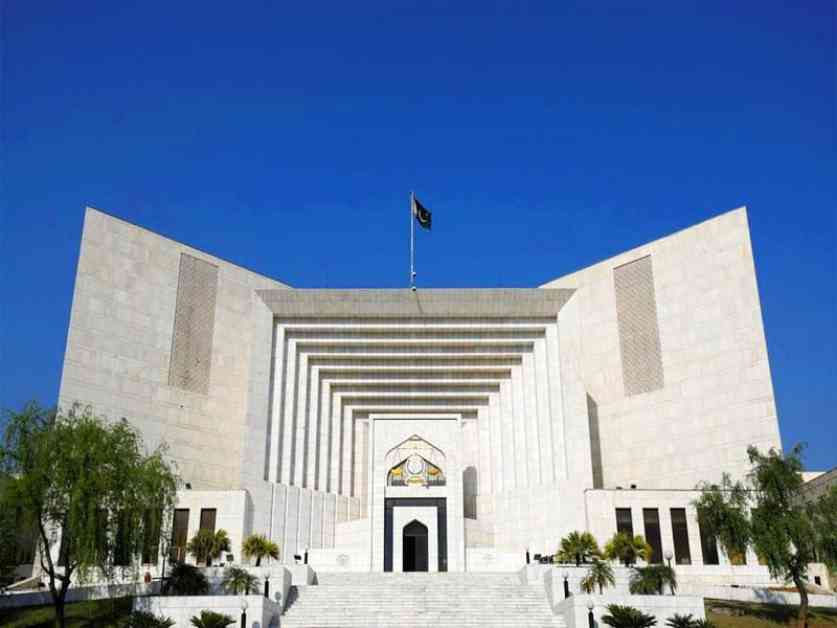The Supreme Court’s Constitutional Bench reconvened to address the appeals challenging the trial of civilians in military courts, sparking a debate over the distinction between the 2014 APS attack and the May 9 protests. Led by Justice Ameenuddin Khan, the seven-member bench heard arguments from Khawaja Ahmad Hussain, who represented Justice (R) Jawad S. Khawaja. During the session, Hussain emphasized that ordinary civilians do not fall under the jurisdiction of the Army Act, which primarily applies to military personnel and civilian employees of the armed forces.
Questioning the Fairness of Military Trials
As the proceedings unfolded, Justice Hassan Azhar Rizvi raised a crucial inquiry regarding the applicability of the Army Act in cases involving airbase attacks. Justice Musarrat Hilali further delved into the heart of the matter by highlighting the stark contrast between the APS attack classified as an act of terrorism and the May 9 protests characterized as a form of civil unrest. This prompted a thought-provoking discussion on the fundamental differences between the two scenarios and the legal implications of trying civilians involved in each incident.
Khawaja Hussain passionately argued that while protesters from the May 9 events should face trial, military courts are not the appropriate venue for these proceedings. Acknowledging the court’s authority to review legislation that may contradict the Constitution, Justice Aminuddin Khan emphasized the need for a balanced approach to ensure justice prevails while upholding the rule of law. Justice Musarrat Hilali, injecting a poignant note into the discourse, highlighted the tragic loss of civilian lives during the APS attack, underscoring the gravity of the matter at hand.
Challenges to the Legitimacy of Military Trials
The proceedings took a compelling turn when Khawaja Ahmad Hussain confronted the issue of the fairness of military trials, citing concerns about the impartiality of the process. Referencing a statement issued by the ISPR regarding the May 9 events, he raised pertinent questions about the military’s role in ensuring a just trial when it is a party to the case. Justice Musarrat Hilali’s astute observation on the lawyer’s arguments underscored the ethical and legal dilemmas inherent in the debate, inviting a deeper reflection on the complexities of military justice systems.
The court’s inquiry into the future trial venue for foreign spies added a layer of intrigue to the discussion, with Justice Hassan Azhar Rizvi probing the implications of nullifying certain provisions of the Army Act. This line of questioning drew attention to the broader implications of legal decisions on national security matters and underscored the need for a nuanced approach to addressing complex legal challenges.
The comparison with the Kulbhushan Jadhav case shed light on the intricacies of espionage trials and the role of military courts in handling such cases. Justice Muhammad Ali Mazhar’s astute questioning highlighted the potential ramifications of striking down key provisions of the Army Act, raising concerns about the future legal landscape surrounding espionage cases. The ensuing exchange between the bench and the lawyer underscored the need for a comprehensive legal framework to address evolving security threats while upholding the principles of justice and due process.
As the hearing drew to a close, the bench expressed concerns over the procedural aspects of military court trials, particularly in relation to legal representation for accused individuals. Khawaja Hussain’s impassioned plea for fairness and transparency in the trial process resonated with the justices, prompting a deeper reflection on the need for accountability and oversight in military justice systems. Justice Mandokhail’s reference to previous rulings and legal precedents added a historical perspective to the discussion, highlighting the importance of upholding the rule of law in all judicial proceedings.
The adjournment of the hearing until February 3 marked a temporary pause in the legal deliberations, inviting further reflection on the complex interplay between military justice, constitutional rights, and national security imperatives. As the legal battle continues, the quest for justice and fairness in military trials remains a pressing concern for all stakeholders involved in the legal process, underscoring the need for a balanced and impartial approach to upholding the rule of law in all circumstances.









